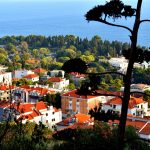ZAGREB, September 6, 2018 – Croatian President Kolinda Grabar-Kitarović said in Zagreb on Thursday, following talks with Azeri President Ilham Aliyev, that Croatia saw Azerbaijan as a strategic partner and that as an EU member state it supported the strengthening of bilateral relations, notably in the economy, energy and security cooperation.
“Croatia sees Azerbaijan as a strategic partner, in accordance with the Declaration on Strategic Partnership signed in 2013… Croatia will remain a true friend of Azerbaijan within the EU and it supports Azerbaijan’s decision to develop individual relations with the European Union,” Grabar-Kitarović said after the talks with her Azeri counterpart, who is on a day-long official visit to Croatia.
The talks focused on “great cooperation potential in energy, the economy, culture, science and technology and education.”
“I am also confident there is room to further defence cooperation between our two countries,” Grabar-Kitarović said.
Grabar-Kitarović also announced Croatia would soon open an embassy in Azerbaijan. In order to step up bilateral cooperation, Croatia’s authorities have decided to open Croatia’s embassy in Baku. Azerbaijan opened its embassy in Zagreb in 2011.
During Aliyev’s visit to Zagreb, the two countries signed an agreement on cultural cooperation and an agreement regulating cooperation in agriculture. Aliyev and Grabar-Kitarović underlined the need for stepping up trade, given that a joint commission for economic cooperation has recently been formed with the purpose of creating new windows of opportunity for further development of relations.
Azerbaijan wants a better trade with Croatia which is why the joint economic commission should continue to do a serious job and simply increase the trade and the realisation of the bilateral projects, Aliyev said after the talks with the Croatian president.
The Croatian president recalled that so far Croatia’s Uljanik shipyard had delivered a few ships to Azerbaijan. Currently there are new and different needs and I believe that we can resume talks so that Uljanik and other Croatian shipyards could continue doing business with Azerbaijan, Grabar-Kitarović said.
Aliyev said his country was implementing large energy projects which will enable the delivery of large amounts of natural gas to European countries. Over the next two years, Azerbaijan will be ready to deliver natural gas to European markets which will be an important contribution to European energy security, Aliyev said, adding that in that context cooperation with Croatia was very important.
Aliyev also held talks with Croatian Prime Minister Andrej Plenković.
Croatia is in deficit in trade with Azerbaijan as evidenced by figures. Trade in 2017 amounted to 226.1 million euro, up 3.4% compared to the year before. Croatia’s exports to Azerbaijan in 2017 amounted to only 698,000 euro, down 53% on the year, while imports from Azerbaijan was 225.4 million euro, up 3.9% on the year. Croatia’s trade deficit amounted to 224.6 million euro.
Grabar-Kitarović said that Croatia, as one of the future European gas hubs, was interested in energy cooperation. “Croatia wants to become a gas supplier for central Europe, through an Adriatic-Ionian Gas Pipeline (IAP),” Grabar-Kitarović said after her talks with Aliyev. During today’s talks she presented plans for the construction of a future LNG terminal on the island of Krk.
During her official visit this oil rich country in the Transcaucasian region in 2016, Grabar Kitarović said Croatia was very satisfied with the decision of the Shah Deniz consortium (2013) on the Trans-Adriatic Pipeline as an integral part of the Southern Gas Corridor and an optimal option for gas supply of South East Europe.
The Southern Gas Corridor, estimated at over 45 billion dollars, is currently one of the largest infrastructure projects in the world, and its route goes from the Caspian gas field of Shah Deniz II via Azerbaijan, Georgia, Turkey, Greece and Albania to Italy.
The Fourth Ministerial Meeting of the Southern Gas Corridor Advisory Council took place in Baku this February when European Commission Vice-President for Energy Union Maros Sefcovic also described this project as strategic for energy security of Europe.
A section of the gas corridor called the Trans-Adriatic Pipeline (TAP) runs from Greece via Albania to Italy, and Croatia could join it through an Adriatic-Ionian Gas Pipeline (IAP). The two corridors – IAP and TAP – are to be interconnected in Albania.
In 2016, Croatia, Albania, Bosnia and Herzegovina, and Montenegro as well as the executives of Azerbaijan’s SOCAR oil and gas company, signed a Memorandum of Understanding for the construction of the future Ionian-Adriatic gas pipeline.







